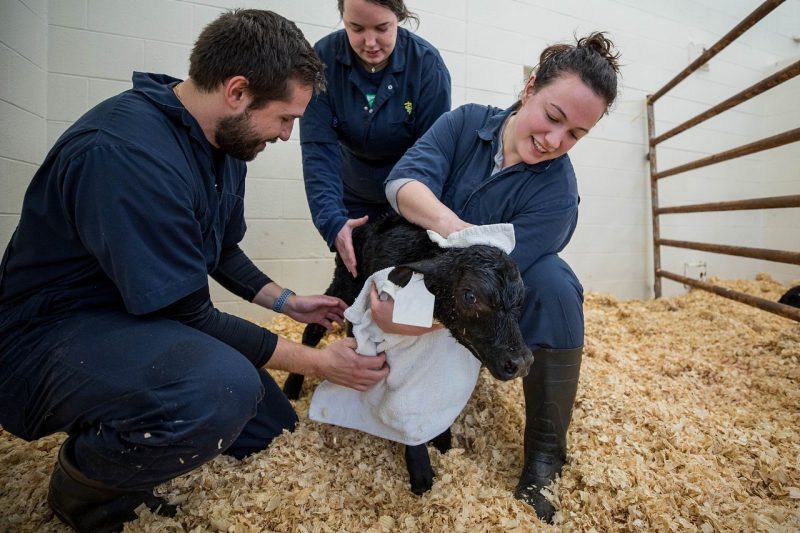
Veterinary students help provide care, under the supervision of faculty, for beef herds on the prison systems’ farms across the commonwealth, and collaborate with farm managers on research into the best practices on feeding, drug administration, breeding, and other farm management topics.
“We have this really tremendous resource in our relationship with the Department of Corrections,” said John Currin ‘90, DVM ‘93, clinical associate professor in production management medicine “They have 2,000 beef cows, a small swine unit, a small goat herd. … They provide endless hours of teaching, research, and data for us to utilize here at the vet school and have just been tremendous partners.”
The relationship also benefits the prison system’s farms, corrections officials said.
“When we want to research any type of protocol for breeding or prove or disprove a theory for a manufacturer about a product, we get to put that down across 2,000 head of cattle,” said Kenny Raiford, director of agribusiness for VDOC. “By the vet school working with the Department of Corrections (DOC), we are on the front side of technology with just about everything we do.
It’s all about helping Virginia farmers get more and better food on the table.
Recently, a dozen fourth-year veterinary students performed their first bovine Caesarean sections, all of them successfully, one of many unique opportunities afforded by the collaboration. Veterinary students in their last year of Doctor of Veterinary Medicine studies have assisted with the calving of DOC heifers since 2010. During a recent meeting of VDOC farm managers, veterinary students, and faculty, fourth-year student Maddie Nardi ‘19, reported that 560 heifers have been brought to Virginia Tech in 14 years during calving, with 520 mother-calf pairs returned successfully to prison system farms, or a 92 percent success rate. No birthing heifers have died during C-sections performed by students.
Fourth-year veterinary student Emily Singh ‘19 told the farm managers’ gathering that a job interviewer was surprised and impressed that she and her classmates had already completed a bovine C-section. “He was floored,” she said, adding that she believed it helped her application.
The experience is so valuable; two alumni veterinarians came back to Blacksburg to provide counsel and supervision for the day of surgeries.
“There is no substitute for hands-on experience,” said Nathaniel Burke ‘05, M.S. ‘07, and DVM ‘11, a large animal veterinarian in Washington, Virginia, who helped oversee the C-sections at the college where he got his first experience performing one. “They’re not seeing their first one when it’s dark and cold with no restraint equipment at 1 o’clock in the morning.”
Students did not seem fazed by the C-section assignment.
Other faculty, staff, and students were on hand for the more cuddly but equally important part of the exercise, taking care of the newborn calves, who began trying to stand up on wobbly legs in their stalls within minutes of their delivery.
The first bovine C-section is a milestone experience for many large animal veterinarians. Emilee Lacey, a large animal medicine resident in the Veterinary Teaching Hospital who was helping attend to the newborn calves, said she remembers her first bovine C-section “like it was yesterday. I like being on the calf side, not on the surgery side.”
Wes Blythe, who manages beef operations for VDOC, said that while working with veterinary students on the prison system’s farms, he has seen some students shift their focus from small animals to cattle. “The way Dr. Currin teaches, it develops some interest in those students,” Blythe said.
Raiford said there is another group on the state prison’s farms besides veterinary students learning skills that can help them in future jobs: prisoners.
A third partner in the relationship is Select Sires, a farmer-owned cooperative contracted for assistance in artificial insemination and genetics to improve the state’s beef herd. “The hands-on experiences veterinary students get with the Department of Correction animals, and the department allowing them to learn to do what the textbook has taught them, it’s just been hugely beneficial for those students,” said Doug Harris, an area sales manager with Select Sires “And the amount of research that has been directed and led by the college of veterinary medicine and allowed and supported by the Department of Corrections has brought the industry forward in a lot of ways.
Raiford said the partnership between the veterinary college and the prison systems’ farms is the envy of his counterparts in other parts of the U.S.
“I can tell you a lot of the agribusiness directors around the country, they’re quite jealous of the partnership we have with Virginia Tech,” Raiford said. “After seeing the value of the research collaboration between the Virginia DOC and Virginia Tech, other corrections agribusiness operations around the country are utilizing their state universities and colleges more. ”





